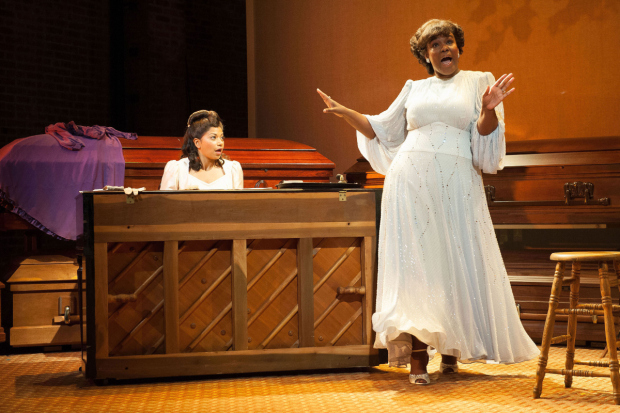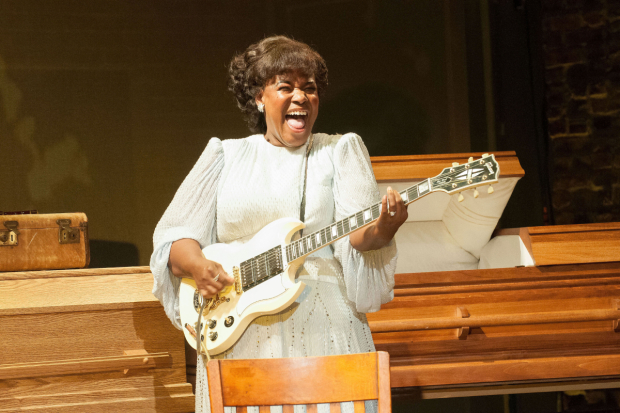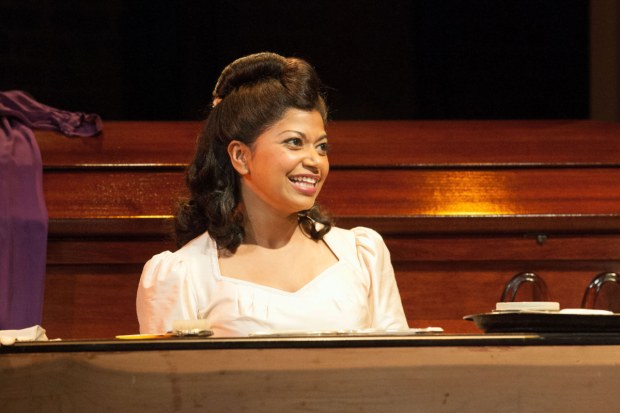Marie and Rosetta

(© Ahron R. Foster)
Surrounded by coffins in a Mississippi funeral parlor circa 1946, two women prepare for the jam session of a lifetime. This unlikely setting is just one of the many surprises in George Brandt's delightful new play, Marie and Rosetta, now making its world premiere at Atlantic Theater Company. Overflowing with heart and music, this show is a not-to-be-missed example of what the theater can do with music once it lets go of all the rules typically associated with musical theater.
Brant is the author of the drone-pilot confessional, Grounded, which starred Hannah Cabel in its excellent New York debut (a subsequent and far more extravagant Julie Taymor-helmed production starred Anne Hathaway at the Public Theater). Brant expands his dramatis personae from one woman to two for this fantasy rehearsal between real-life blues singer Sister Rosetta Tharpe (Kecia Lewis) and her collaborator, the young musician Marie Knight (Rebecca Naomi Jones). Rosetta has recently convinced Marie's mother to let her daughter join her on a comeback tour. An old star on the gospel circuit, Rosetta also regularly performs in nightclubs, earning the disdain of the pious. She hopes that Marie's "high church" sound will help her get back in their good graces. What begins as a somewhat awkward trial run between an old show-business pro and her would-be apprentice turns into a touching portrait of the relationship between two women.

(© Ahron R. Foster)
Tharpe, who was often called the "Godmother of Rock and Roll," was a lady who wailed on the guitar in a time when few female artists even played, influencing rock in a way that cannot be overstated. She has been cited as a favorite performer by Little Richard, Johnny Cash, and Chuck Berry.
Lewis easily inhabits this towering (but still underappreciated) figure of American music, filling the theater with her giant voice and even bigger personality on the very first number, "This Train." Her luxuriant "R" during the song "Rock Me" makes the godly Marie very nervous, but Rosetta's spirit will not be restrained: "God don't want the Devil to have all the good music right?" Lewis plays the role of irreverent mother to perfection, schooling her impressionable postulant even as she learns some things herself.
Sporting a delicate vibrato, Jones convincingly completes a radical character arc, going from what appears to be a mousy and eager-to-please teenager to a sizzling musical dynamo in her own right. Even when she clearly disapproves of Rosetta's hip-swinging soul, her respect for the older woman is palpable. Their rollicking duet on "Didn't It Rain" is a real crowd-pleaser, as is their naughty rendition of "Tall Skinny Papa," which features both women burning up the piano.
Of course, they're not actually playing, but you wouldn't immediately know that thanks to the sly work of director Neil Pepe and music director Jason Michael Webb. Lewis moves along the fingerboard of her guitar and strums while guitarist Felicia Collins (masked by an upstage scrim) actually plays behind her; everything is perfectly timed. The talented Deah Harriott does the same on piano, and we never question that the two actors are really playing — that this is what Tharpe and Knight really sounded like. SCK Sound Design is able to achieve exquisite sound balance from this arrangement, making it feel like a really good concert experience.

(© Ahron R. Foster)
Riccardo Hernández has realistically designed the set for this uncommon rehearsal studio, an assortment of caskets circling the room. "You keep an eye out for ghosts. I'm gonna be snoring in the corner in the deluxe satin-lined model," Rosetta tells the skittish Marie after explaining that it's impossible for black performers to secure a hotel room in the Jim Crow South and considering their other options (a garage, someone's couch), this macabre accommodation is a relative luxury. They even have a rehearsal piano! Playfully lighting around the scrim so that the backstage musicians come into focus near the end, lighting designer Christopher Akerlind helps to create an atmosphere that feels like a particularly vivid dream, one that tricks you into thinking that you are really awake.
Most impressively, Marie and Rosetta smartly incorporates music throughout its 90 minutes without falling into the traps that so often accompany contemporary musical theater: No songs feel forced or shoehorned to satisfy fans of the original artists. They come naturally and regularly add to the emotional resonance of the play. Marie and Rosetta is an intimate story about the relationship between two women, their shared anxieties and hopes, and the way they lift each other up through music. It's enough to make the theater faithful stand up and shout "Hallelujah!"











